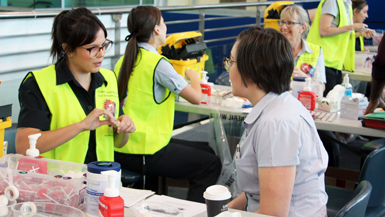Prepare now for flu season

Staff at RBWH receive their flu vaccinations.
Hospitals across Queensland are mobilising for a sharp increase in flu patients ahead of the busy winter period.
Royal Brisbane and Women’s Hospital emergency medicine specialist Dr David Rosengren said the 2017 flu season was one of the worst on record in Queensland, with 56,094 flu notifications and 6,070 hospitalisations.
“The flu is already having an impact on our hospital Emergency Departments so now is the time to get your flu shot,” Dr Rosengren said.
“Here at RBWH, staff have seen more than 680 patients with flu-like illnesses come through the busy Emergency Department since January.
“Our hospital and ambulance staff do a terrific job, but additional and sometimes unnecessary presentations or ambulance call outs can place a strain on resources.
“Getting an annual flu shot is the most effective way to protect yourself, your loved ones, co-workers and the community and avoid an unnecessary trip to an ED.
“We urge people of all ages to get vaccinated; however younger children are particularly susceptible. Last year more than 580 kids under five were hospitalised due to flu.”
The traditional winter period is always incredibly busy for hospitals and this year is expected to be no different.
Last year Emergency Departments in Brisbane North saw a combined average of 792 patients a day from May to September.
“Meeting this high demand can be challenging for our staff and impacts patients who need urgent care. We don’t want to see a repeat of this again,” Dr Rosengren said.
“Already this year across Metro North’s hospitals, we have seen more than 4,000 patients come through our EDs with flu like illness.
“We know the best way to avoid ending up in ED this winter is to be prepared. We are. Thousands of our staff are being vaccinated against flu and we’re encouraging every Queenslander to do the same.
“The more people who are vaccinated the less likely the flu will spread in the community.”
Dr Rosengren said EDs across Queensland experienced an unprecedented demand for health services last year, which put significant strain on frontline staff.
“While we will never turn away anyone requiring medical treatment, patients needing life-saving treatment will always be seen first. This means that if you present to an ED with a condition that could be better managed by your GP, you may wait for some time before being seen,” he said.
“We ask you to please be patient if you need to wait longer than normal so our staff can treat most serious cases first.”
Queensland Ambulance Service Director of Clinical Quality and Patient Safety Tony Hucker said calling an ambulance for flu like symptoms could divert valuable emergency resources away from more critical patients.
“We ask that before calling Triple Zero (000) you consider if your situation is an emergency or if your symptoms can be treated by your family GP,” Mr Hucker said.
“If it’s not an emergency, you could be utilising resources that could have been valuable to a critical patient in need.”
Public Health physician Dr Bhakti Vasant said last year’s flu numbers highlight the importance of annual immunisation.
“Flu viruses are always changing, which is why it’s important to have a flu shot every year. It’s the most effective protection against the flu,” she said.
“Two new funded vaccines are available for people aged 65 years and older. These vaccines have been specifically made for older people as their immune systems respond less effectively to vaccines.
“Talk to your GP, childhood immunisation provider or pharmacist now about getting vaccinated.”
